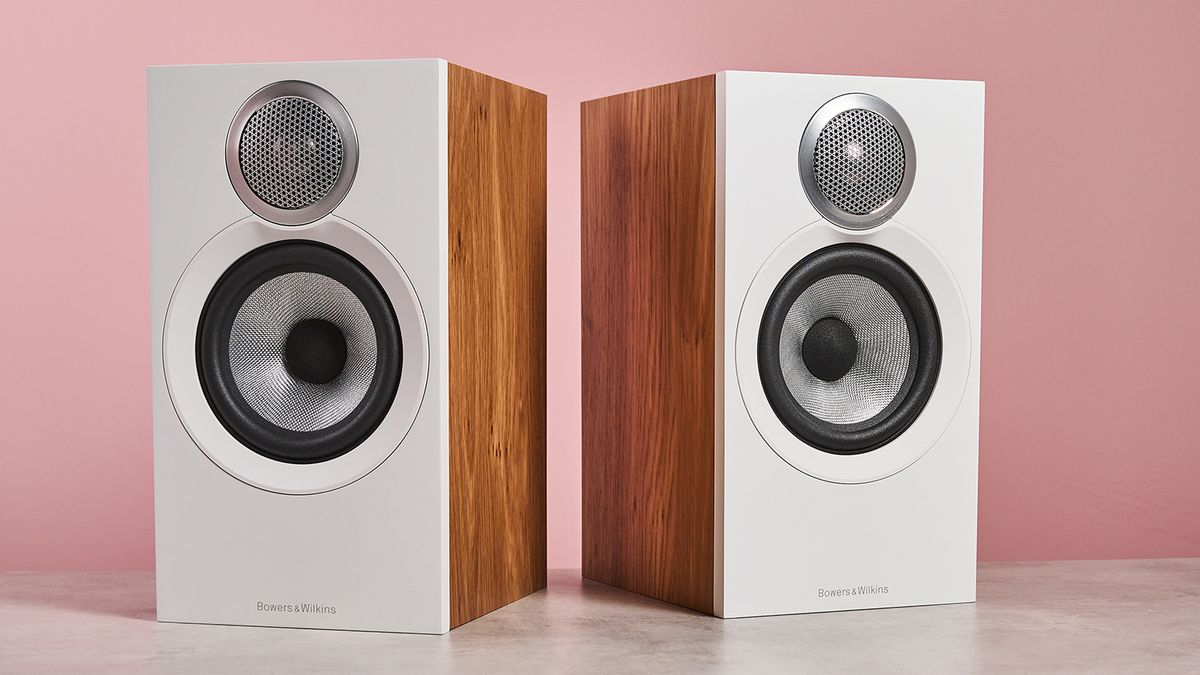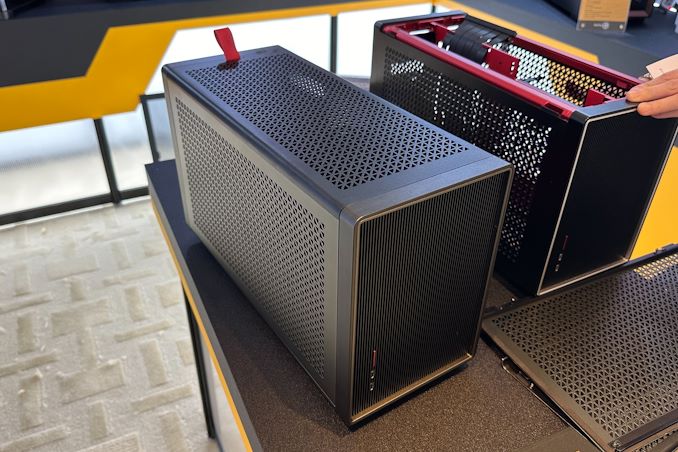Time flies, doesn’t it? This is now the eighth generation of Bowers & Wilkins’ entry-level 600 Series of loudspeakers, and the 607 S3 is the smallest and most affordable member of the range. It’s also the most expensive cheap loudspeaker the company has ever made.
A glance at the specification (25mm double-dome tweeter, 130mm Continuum mid/bass driver, and a whole stack of upgrades both where crossover and cabinet construction are concerned) and at the standard of build and finish lets you know where that money has gone, though – and goes some of the way to explaining why they’ll enter our best stereo speakers roundup very soon.
It’s always been possible to buy less expensive loudspeakers than Bowers & Wilkins, but if you bite the bullet and spend the money, it won’t take long for your investment to seem very wise indeed.
By the standards of a compact standmounter, the 607 S3 produce a remarkably open and assertive sound. They have scale and rigorous soundstaging on their side, frankly unlikely dynamic headroom and an excellent facility for detail retrieval. They seem to like every single genre of music, too – and not just in an analytical, “here’s every shred of information” kind of way. They’re an energetic and entertaining listen that seem fully aware that the business of listening to music is meant to be as enjoyable and emotionally rewarding as possible.
So yes, you can spend your money on a bigger, louder loudspeaker than this – of course you can. But if you’re not trying to fill a great big space with sound, and if you want to put your foot on the ownership ladder of one of the biggest names in the business, the 607 S3 absolutely demand your attention.
(Image credit: Bowers & Wilkins)
Bowers & Wilkins 607 S3 review: Price & release date
Released September 3, 2023 Priced $899 / £549 / AU$1,149 (approx)
The Bowers & Wilkins 607 S3 standmount speakers were unveiled in September 2023 alongside three other S3-suffixed 600-series models , and in the United Kingdom they’re routinely available at £549 per pair. In the United States they go for $899 tops, while in Australia they sell for AU$1149 or something very like it.
So while this is the most affordable way to acquire a new pair of Bowers & Wilkins passive stereo loudspeakers, you’ll never mistake the 607 S3 for being especially cheap – profoundly credible alternatives from profoundly credible brands like Dali (see the five-strong Dali Rubikore range ), Monitor Audio (check out our Monitor Audio Studio 89 review ) and Q Acoustics (see the M40 HD for starters) many of which can be had for less money than this. So what makes the 607 S3 so special?
Bowers & Wilkins 607 S3 review: Features
(Image credit: Bowers & Wlkins)
25mm titanium double-dome tweeter 130mm Continuum mid/bass driver Rear-firing bass reflex port
Yes, the 607 S3 is the junior member of the most affordable Bowers & Wilkins passive loudspeaker line-up. But don’t imagine that status means that it’s had less attention paid to its features than all of its other, more expensive, siblings.
The tweeter arrangement, for example, is now built mostly from titanium (rather than of aluminium as it has been in previous 600-series models). It’s a 25mm decoupled double-dome design, using a thin (25µm) dome reinforced by a 30µm ring, and the switch to titanium allows (according to Bowers & Wilkins) for greater refinement and detail at the top of the frequency range.
The tube-loading assembly in which the tweeter sits is longer than previously (in an effort to minimise the rearward standing waves that result from the twitter’s activity), and the tweeter itself is protected by a grille the design of which is derived from the company’s flagship 800 Signature series of speakers. This, too, is deployed in an effort to create greater space and refinement in the tweeter’s output.
(Image credit: Bowers & Wilkins)
The tweeter sits closer to the mid/bass driver beneath it than previous – the 130mm Continuum assembly is mostly carried over from the previous 600 Signature series, but now it features a beefed up motor assembly derived from the 700 S3 range. And the eagle-eyed will notice it’s a little higher up in the cabinet and a little closer to the tweeter as a result – Bowers & Wilkins reckons it improves integration between the drivers and allows the mid/bass unit to generate a little more energy.
At the rear of the cabinet there’s a bass reflex port positioned above some newly upgraded speaker cable terminals (they’re intended to offer a cleaner signal path). And on the inside, the cabinet bracing is upgraded – so rigidity is improved. The crossover components have been upgraded too, in an effort to bring even greater transparency to the sound.
Bowers & Wilkins 607 S3 review: Sound quality
Refinement and entertainment in fairly equal measure Dynamic and detailed in every circumstance Careless system-matching will be exposed
(Image credit: Bowers & Wlkins)
‘Zest’ is an underused word in hi-fi, I think, so let’s start there. No matter the sort of music you like to listen to, the Bowers & Wilkins 607 S3 deliver it with zest. Oh, they can do the ‘insight’ and ‘analysis’ things with the best of their price-comparable rivals, but what sets them apart from those alternative designs is the zest and enthusiasm of their delivery. There’s nothing feral about these loudspeakers, but there’s an energy and a desire to entertain that is a fair bit more difficult to come by.
So it doesn’t matter if you try out a nice big hi-res file of David Bowie’s Hallo Spaceboy or a CD-standard file of Anastasia Coope’s Woke Up and No Feet, the results are – broadly speaking – the same. Low-frequency activity is given decent depth and notable speed, along with plenty of variation; the 607 S3 have no difficulty expressing rhythms in a convincing manner. The midrange is open and eloquent, so these two profoundly idiosyncratic vocalists have their character and attitude made apparent. Midrange projection is good too, so there’s always a pocket of space for a singer to operate in – even though they’re always nicely integrated into the overall presentation, rather than sounding remote or removed.
There’s plenty of dynamic headroom available, so the Bowie tune gets its changes in attack and intensity described faithfully. Detail levels are very high in every respect, so the smaller harmonic variations and changes in emphasis in the recording are paid attention to as well. And thanks to a soundstage that’s bigger than the physical size of the speakers might seem capable of creating, it’s easy to follow these fluctuations no matter where they occur.
They’re an upfront and fairly assertive listen, the 607 S3. And in almost every way, these are welcome and actually quite valuable traits – it generally translates into a vivacious, spirited and engaging presentation. But it also means that a moment’s care with system-matching is in order, because the Bowers & Wilkins have high-frequency characteristics that are not beyond provocation.
The treble sound the 607 S3 produce is just as detailed, just as convincing and just as nicely tonally balanced as all of the information below it. But in a system with treble-forward amplification, being fed by a source player with similar characteristics, the result can easily become rather too much of a good thing. The Bowers & Wilkins are quite assertive enough at the top of the frequency range without being goaded.
But in every other respect, feel free to throw caution to the wind. The 607 S3 are musical and entertaining, poised and attentive, dynamic and detailed in equal measure, and seem to enjoy every single one of your favourite styles of music. They may not have the out-and-out scale of the bigger speakers this sort of money can buy – how could they? – but when it comes to musicality, energy and, yes, zest, it’s hard to know how your money could be any more wisely spent.
Bowers & Wilkins 607 S3 review: Design
(Image credit: Bowers & Wilkins)
300 x 165 x 207mm (HxWxD) Choice of three finishes 4.65kg
You can’t really expect much by way of ‘design’ to happen where (relatively) affordable standmounting speakers are concerned – and, sure enough, not much has happened here. That’s not to say the 607 S3 aren’t harmonious lookers, or aren’t built and finished to a very high standard – they are. It’s just that they look exactly as you’d expect.
At 300 x 165 x 207mm (HxWxD) they’re the smallest stereo speakers in all of Bowers & Wilkins-land, and at 4.65kg they aren’t going to put any kind of pressure on your shelves or wall-brackets if that’s how you decide to position them.
Equally, a choice of black, white or light(ish) oak vinyl-wrap finishes isn’t going to startle anyone. The oak finish comes with a contrasting white front baffle, which is about as close to a design flourish as the 607 S3 get.
Bowers & Wilkins 607 S3 review: Value You can buy bigger, more imposing loudspeakers for this sort of money – and I mean both physically and sonically. But if you’re in the market for a compact, high-achieving standmounter at this kind of price, it’s hard to know how to better spend your cash. Add in the excellent standard of build and finish, along with the ‘if you know, you know’ brand logo, and the 607 S3 represent very good value indeed.
Should I buy the Bowers & Wilkins 607 S3?
(Image credit: Bowers & Wilkins)
Buy them if…
Don’t buy them if…
Bowers & Wilkins 607 S3 review: Also consider If the size of these cabinets is a big attraction, then the only-slightly-larger and similarly priced Dali Oberon 3 are well worth a listen – they don’t have quite the vim of the 607 S3. That said, the splendid Monitor Audio Studio 89 do – although they’re quite a bit more expensive.
Want something smaller, wireless, and slightly cheaper? The Ruark MR1 MkII Bluetooth stereo speakers are worth a look.
But if you’re after a physical representation of the money you’ve spent (and you have an appropriately sized space in which to put them) the Wharfedale Diamond 12.3 have plenty to recommend them beyond how very large they are.







